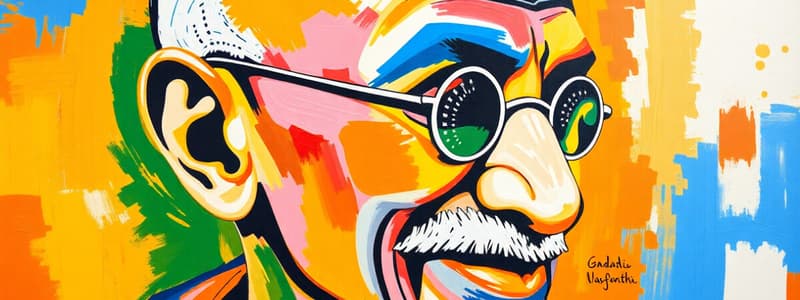Podcast
Questions and Answers
What principle did Gandhi advocate that emphasizes non-violence?
What principle did Gandhi advocate that emphasizes non-violence?
- Karma
- Satya Yuga
- Dharma
- Ahimsa (correct)
Which campaign did Gandhi lead in 1930 to protest the British salt tax?
Which campaign did Gandhi lead in 1930 to protest the British salt tax?
- Non-Cooperation Movement
- Champaran Satyagraha
- Salt March (correct)
- Kheda Satyagraha
What was one of Gandhi's methods for achieving independence that involved peaceful protests?
What was one of Gandhi's methods for achieving independence that involved peaceful protests?
- Revolutionary violence
- Military engagement
- Political dictatorship
- Satyagraha (correct)
What event addressed the grievances of farmers in Bihar in 1917?
What event addressed the grievances of farmers in Bihar in 1917?
How is Gandhi commemorated annually in India?
How is Gandhi commemorated annually in India?
Study Notes
Early Life
- Born on October 2, 1869, in Porbandar, India.
- Studied law in London and became a barrister.
- Moved to South Africa in 1893, where he fought against racial discrimination.
Principles and Philosophy
- Advocated for Ahimsa (non-violence) and Satyagraha (truth force).
- Believed in peaceful protests and civil disobedience.
- Emphasized self-reliance, promoting the Swadeshi movement (use of Indian-made goods).
Role in Indian Independence Movement
- Returned to India in 1915 and became a key leader in the struggle for independence.
- Led significant campaigns:
- Champaran Satyagraha (1917) – addressed grievances of farmers in Bihar.
- Kheda Satyagraha (1918) – supported peasants affected by famine and tax issues.
- Salt March (1930) – a 240-mile march to protest the British salt tax.
Political Engagement
- Encouraged mass participation in the independence movement, involving various groups and communities.
- Promoted Hindu-Muslim unity.
- Engaged in negotiations with British authorities for India’s autonomy.
Legacy
- Known as the "Father of the Nation" in India.
- Assassinated on January 30, 1948, by Nathuram Godse.
- His ideologies influenced global leaders and movements, including Martin Luther King Jr. and Nelson Mandela.
- Celebrated annually on October 2nd as Gandhi Jayanti and International Day of Non-Violence.
Early Life
- Mahatma Gandhi was born on October 2, 1869, in Porbandar, India.
- He studied law in London and became a barrister.
- Gandhi moved to South Africa in 1893, where he faced and fought against racial discrimination.
Principles and Philosophy
- Gandhi advocated for Ahimsa (non-violence) and Satyagraha (truth force) as core principles for social change.
- He believed in peaceful protests and civil disobedience to resist injustice.
- He emphasized self-reliance and promoted the Swadeshi movement, which encouraged the use of Indian-made goods.
Role in Indian Independence Movement
- Gandhi returned to India in 1915 and became a prominent leader in the struggle for independence against British rule.
- He led several significant campaigns, including the:
- Champaran Satyagraha (1917) to address grievances of farmers in Bihar.
- Kheda Satyagraha (1918) to support peasants affected by famine and tax issues.
- Salt March (1930) – a 240-mile march to protest the British salt tax.
Political Engagement
- Gandhi encouraged mass participation in the independence movement, bringing together various groups and communities.
- He promoted Hindu-Muslim unity.
- He engaged in negotiations with British authorities to achieve India’s autonomy.
Legacy
- Gandhi is known as the "Father of the Nation" in India for his significant role in achieving independence.
- He was assassinated on January 30, 1948, by Nathuram Godse.
- His ideologies and philosophy have influenced global leaders and movements, including Martin Luther King Jr. and Nelson Mandela.
- Gandhi Jayanti and International Day of Non-Violence are celebrated annually on October 2nd in his honor.
Studying That Suits You
Use AI to generate personalized quizzes and flashcards to suit your learning preferences.
Description
This quiz explores the early life, principles, and contributions of Mahatma Gandhi to India's independence movement. Test your knowledge on his advocacy for non-violence, civil disobedience, and major campaigns that shaped the struggle for freedom in India.




